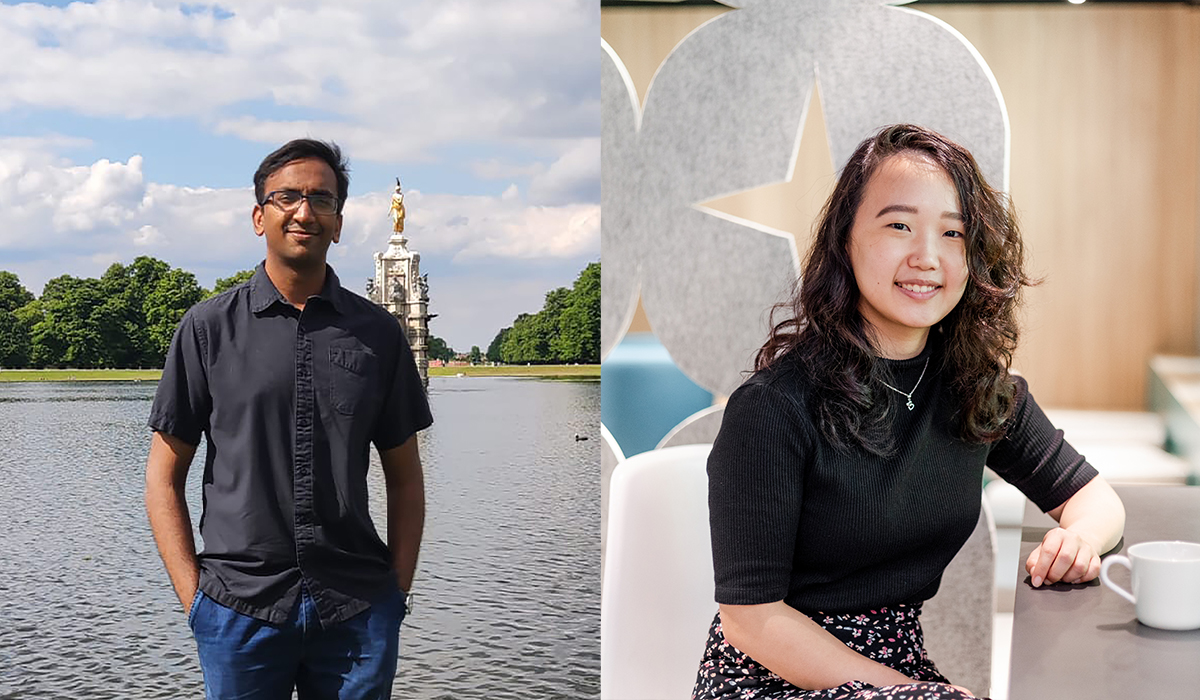Left: Harish Karthick is an MCI Information Service Scholarship recipient. He is currently pursuing a Bachelor of Science in International Social and Public Policy at The London School of Economics and Political Science.
Right: Chia Li Fang is an MCI Information Service (Translation) Scholar who holds a Bachelor of Arts from the University of Hong Kong and Master of Arts (Translation and Interpretation) from Nanyang Technological University. She is currently an Assistant Manager (Translation) in the Public Communications Division at MCI.
The Ministry of Communications and Information (MCI) oversees the development of infocomm technology, cyber security, media sectors, and the Government’s information and public communication policies. By leveraging digital tools and innovative strategies, MCI works to forge a thriving digital future for Singapore while keeping people at the core of their efforts.
MCI Information Service Scholars like Harish Karthick and Chia Li Fang are at the forefront of this exciting work. Karthick is currently pursuing a Bachelor of Science in International Social and Public Policy at The London School of Economics and Political Science and will return to MCI to contribute as an Information Officer when he graduates. Meanwhile, Li Fang, an Assistant Manager in the Translation Department under the Public Communications Division, works on integrated public communications to enhance communications through effective translations.
We had a chat with the duo about how their enriching experiences at MCI have steered their interests thus far.
What sparked your interest in Public Communications?
Karthick: The global economic crisis, where the spread of financial contagion was exacerbated by economic openness, made me deeply interested in trying to unpack the complexities of the economic system we live in and specifically how we can help people. As I further refined or refocused this interest in the years to come, I realised that I was deeply fascinated by the complexity in public policy, which often contended with overlapping interests, trade-offs and incentives.
Specifically, I wanted to better understand how to navigate this complexity in helping people, not just those well to do but as my favourite author Arundhati Roy puts it, “the deliberately silenced and preferably unheard.” This sparked my interest in public communications as I wanted to see how I can help people understand policies better.
Li Fang: My interest in translation was sparked after taking it as a subject in junior college. I have always been interested in bilingualism and Singapore’s bilingual education policy – joining the Translation Department at MCI was thus one of the most direct ways to play a role in raising the translation standards in Singapore.
What kind of support did you receive through the MCI Information Service Scholarship?
Karthick: MCI has been highly supportive of not just my undergraduate education but other opportunities for self-development such as summer school programmes and other training courses. I also had the opportunity to intern at MCI’s Media Division, which enabled me to expand my network and gain valuable insights into the multi-faceted challenges of communications work. My supervisors and colleagues were readily available to support and provide me with guidance throughout the internship. During my internship, I had the chance to make suggestions and even work on new ideas that were then taken on by my department. Despite being an undergraduate student, my views were taken seriously and my contributions were valued enough to be taken on by the department for future research even after the end of my internship.
Li Fang: On top of my tuition fees and allowance throughout the course of my undergraduate studies, the scholarship supported my semester-long exchange in the UK. I was also offered internship opportunities at different MCI departments during semester breaks which gave me exposure to the different aspects of government communications.
Karthick, tell us more about the undergraduate degree programme that you are currently undertaking.
Karthick: I am currently pursuing an undergraduate degree in International Social and Public Policy at the London School of Economics. While the degree is a mouthful, I chose it as it allowed me to have a worldwide perspective on public policy, considering not just experiences in Western countries, but also developing or newly industrialising countries like Singapore.
By combining economic, politics, policy with modules in international relations and statistics for example, the degree appealed to me because of how holistic it was, emphasising real-world applicability over theory or impractical mathematical models.
Li Fang, how have you been able to apply your academic experience to your current work?
Li Fang: Other than the linguistic and translation skills that are directly relevant to my work at the Translation Department, learning about translation has also guided my approach towards government communications as a whole. I think many who do not have any knowledge or experience in this field often think about translation as simply an act of converting words from one language into another. However, this overlooks the fact there is often a message to be conveyed behind all these words. Therefore, translators help convey messages from one language to another, bridging the gap between two language communities in this process.
This is essentially what public communications is about – exploring various ways to effectively communicate government policies and initiatives to the public. It is not about using the most polished expressions or simply providing people with figures and statistics – the policies rolled out by the Government would have little impact if its people were not able to understand how they benefit from them or how they could tap on such initiatives.
Can you also tell us more about your current responsibilities at MCI?
Li Fang: A typical workday starts with any translation requests the team receives – these include commentaries and letters from the vernacular papers, infographics on upcoming government initiatives from other MCI departments or agencies, or sometimes the speeches to be delivered by Ministers.
We also focus on translation projects to raise the overall translation and language standards in Singapore. For instance, the team developed and now oversees the SG Translate Together web portal (which allows members of the public to generate translations in English, Chinese, Malay and Tamil online freely), and also plans engagement sessions with Citizen Translators (any member of the public who is interested in translation-related activities) to share their opinions on translations in government communications as well as conferences that bring industry players together. These are just two of the many exciting projects the team works on.
Karthick, what advice would you give to someone considering applying for a scholarship with MCI?
Karthick: My motivation to apply for a scholarship was spurred by my commitment to the cause of the Public Service and making the lives of Singaporeans better. If this excites you and you are interested in communications and messaging of government policies, then MCI is an amazing place to work and grow.
Li Fang, what possibilities can people and scholars look forward to at MCI?
Li Fang: As an Information Officer, opportunities are plentiful – you will not only be able to rotate amongst different departments in MCI every couple of years but will also have opportunities to post out to the communications department of other ministries and agencies.You will get to be exposed to multiple aspects of government communications work during your time in MCI and in public service.
I chose MCI as it offered an opportunity to hone my interest in translation and languages while engaging in work which I found to be meaningful – to play a part in bridging the Government and the public through effective communication.



